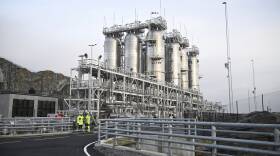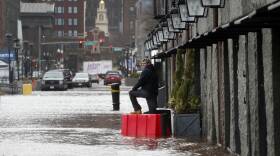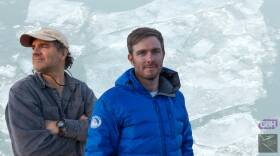-
As carbon dioxide builds up in the atmosphere, many companies are working to capture it
Laura Lammers of the carbon capture company Travertine says if humans were to stop emitting CO2 today, it would still take thousands of years for the Earth to take back what has already been emitted. -
From advanced robots to green steel, here's breakout tech to watch in 2025
The MIT Technology Review released its annual report on what technologies are likely to have the biggest impact on the way we live and work in the future. -
Boston is slowly sinking. That doesn’t help sea level rise due to climate change.
“Because of sea level rise — and subsidence is contributing about 15% to that — we can expect about 50 king tide flooding events per year by the year 2050,” one UMass Lowell professor told GBH News. -
Thaw & Freeze: The Ecological, Geological, and Human Stakes of a Warming Arctic
A rapidly changing Arctic is reshaping everything. Polar bears navigate shrinking expanses of sea ice, thawing permafrost threatens coastal villages, destabilizes infrastructure, and exhales methane, and warming temperatures push more species northward into a greener arctic. These transformations are profound, and their impacts can extend far beyond the region’s ecologies that depend on them.
What do these changes mean for wildlife, humans, and the climate? How is all of this going to play out in different regions and ecosystems around the world? Does understanding these changes and seeing them with your own eyes change the way you see everything else?
Join Biodiversity for a Livable Climate for a conversation that convenes story and science, writer and researcher to help shape our understanding of what this means for the Arctic, our climate and the webs of life that depend on both. Jon Waterman, writer for both Patagonia and NatGeo, and author of Into the Thaw, is by Dr. Flavio Lehner, Chief Climate Scientist at Polar Bears International—one a storyteller of the Arctic’s systems, the other a researcher of them.Partner:Biodiversity for a Livable Climate -
How to cope with asthma during 'peak week' for flare-ups
Asthmatics deal with growing impacts of climate change as allergy seasons grow longer. -
Encore: From kelp burgers to biofuel, some see a bright future for seaweed
From food to biofuel and everything in between, some experts believe this billion-year-old algae is the wave of the future. -
A History of Our Future
Luisa Neubauer, the acclaimed German climate activist and co-founder of the school strike for climate movement in Germany, commonly referred to as Fridays for Our Future discusses her recent co-authored book, Beginning to End the Climate Crisis: A History of our Future with Sabine von Mering, director of the Center for German and European Studies and professor of German and women’s, gender, and sexuality studies at Brandeis University and co-editor of the forthcoming Routledge Handbook of Grassroots Climate Activism, and a climate activist with 350Mass, and Jule Manitz, a climate justice activist with Extinction Rebellion Boston, where she plays a pivotal role in organizing and supporting impactful protests, including civil disobedience actions.
The moderator is Beth Daley, executive editor and general manager of The Conversation and a Pulitzer Prize finalist for climate reporting at The Boston Globe.
In this book, Luisa Neubauer, the best-known German climate activist, and her co-author create the history of our future. If we don’t change course now, we’ll eliminate ourselves. Politicians, entrepreneurs, citizens, everyone must take action. But how? One thing is undisputed: There is no planet B. We must inform and organize ourselves to save the future. In Beginning to End the Climate Crisis, Neubauer presents solutions that are ready to be implemented and must finally be put into practice. But she also demonstrates the attitude with which we must deal with this exceptional situation: undaunted but level-headed. And unyielding towards those who determine our future. Because the last chance for a positive end to the climate crisis is NOW.
This event is part of a new series of author events - the First Annual Book Festival- , presented by Ford Hall Forum at Suffolk University and Brandeis University Press. The series is based on recently published books from Brandeis University Press and brings prominent authors to Boston to discuss topics of current and enduring interest.Partner:Ford Hall Forum -
Warming waters off Cape Cod could mean sharks linger there longer
Waters in the Gulf of Maine, the Atlantic patch off New England’s coasts, are warming faster than the rest of earth’s oceans — and that affects ocean life. -
As summers become hotter, Boston moves to implement its heat resilience plans
"It takes the a whole city approach," said Matt Kearney, deputy chief of the office of emergency management. -
Former Lynn landfill to be converted into a waterfront park
A former landfill will help protect the coastline and provide recreation to Lynn residents.









